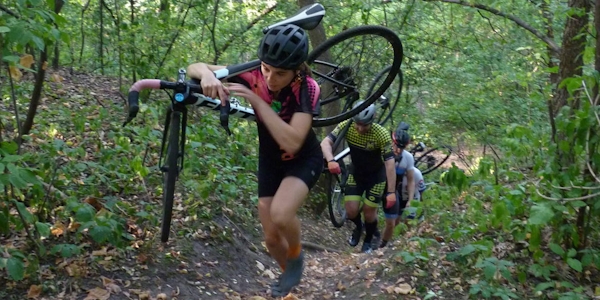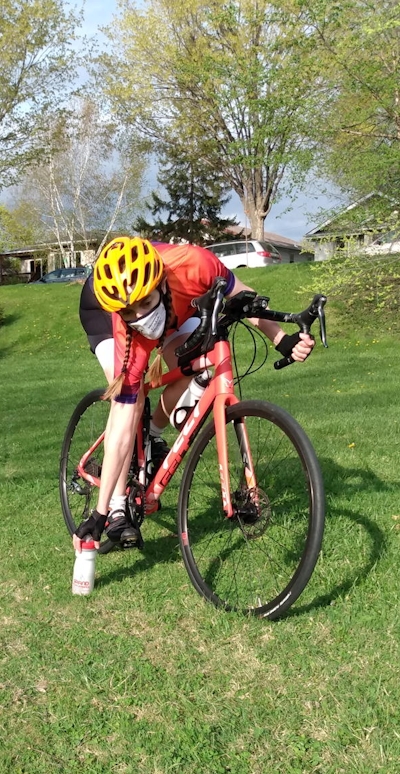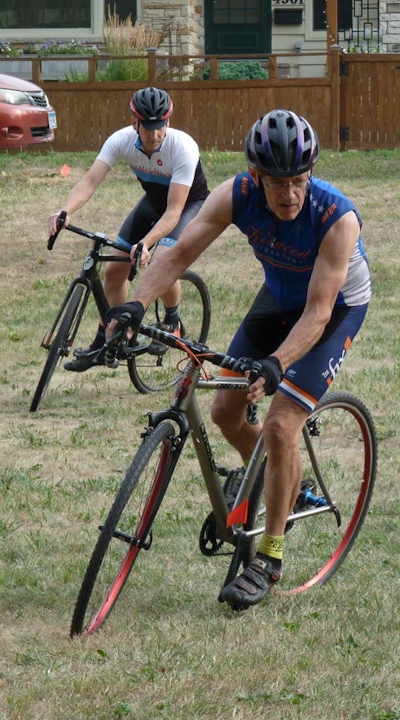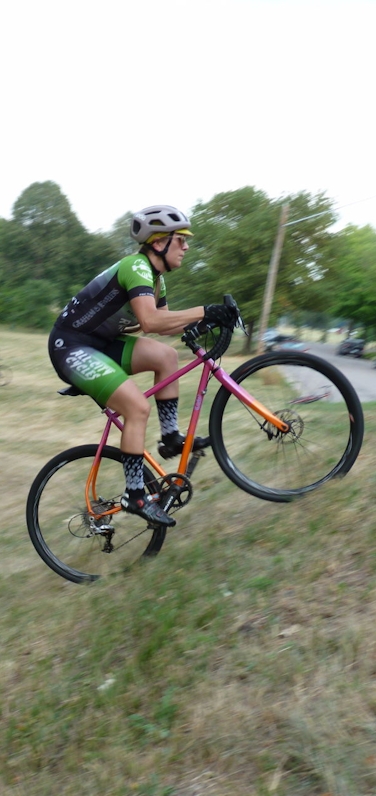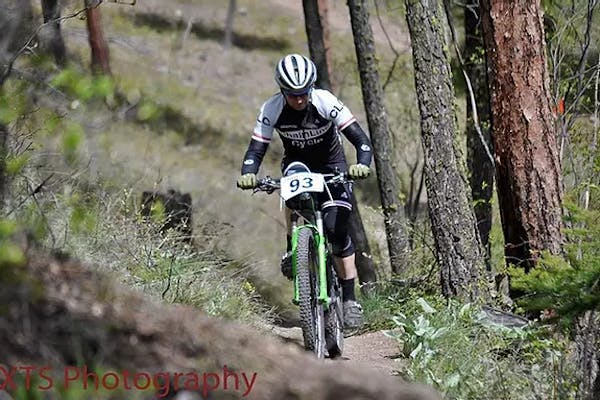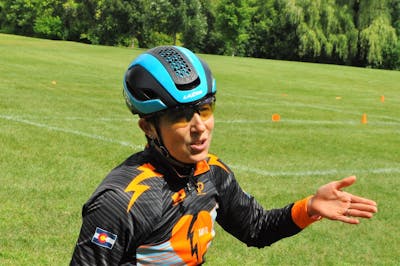July 2022: Cyclocross Clinics & Cycling Tips For All Levels |
FTW Cyclocross Skills - Level I REGISTER HERE |
|
|
2022 FTW Cyclocross Skills - Level 1 Mondays, Aug 1 - 29 Get the comprehensive introduction to cyclocross. This clinic will cover basic elements, techniques, and decisions to improve your confidence and skill over various surfaces and obstacles -- just in time for the start of Endurance Promotions August/September Tuesday Night CX! Who's it for? FTW beginner to intermediate riders Dates: Monday Evenings 5:30 pm -7:00 pm (Aug 1, 8 (Zoom), 15, 22, 29) Equipment: Road, Cross, MTB, or Gravel bike with MTB or flat pedals. More Information: Click here. Pre-registration only and limited to 10 participants. Register ASAP. |
| |
|
2022 Cyclocross Refresher Tuesdays, Aug 2 - 16 Sharpen your skills before Endurance Promotions Tuesday Night Cyclocross kicks off on August 23! This series will review skills, address questions, and provide expert feedback as you practice. Who's it for? Riders with at least basic grasp of CX fundamentals Dates: Tuesday evenings 5:30 pm -7:00 pm (Aug 2, 9, 16) plus Advanced CX Skills/Tactics Zoom (Wed, Sept 7) More Information: Click here. Pre-registration only and limited to 12 participants. Register ASAP. |
| |
|
2022 Advanced Cyclocross Skills & Training Thursdays, Sep 1 - 22 Take your cyclocross skills to the next level. This series will offer a chance to hone your skills and fitness for riding steep ups/downs, off-cambers, and challenging features, as well as review & practice cross racing tactics at speed. Who's it for? Riders proficient in CX skills, interested in improving skill and fitness Dates: Thursday Evenings 5:30 pm -7:00 pm (Sept 1, 8, 15, 22) plus Advanced CX Skills/Tactics Zoom (Wed, Sept 7) More Information: Click here. Pre-registration only and limited to 12 participants. Register ASAP. |
| |
|
Training Tip: She's Going the Distance! Training for Long Rides |
|
|
It's that time of year when athletes are gearing up for long rides: solo efforts, tours, and long races. Key considerations for longer efforts are aerobic fitness, strength, saddle time, freshness/recovery, fueling, and perhaps heat management. Let's discuss these factors: - Aerobic fitness is gained via long, slow efforts. As far as duration, you DON'T need to practice the full "race time" in your training. For example, I find an athlete can do a 7-hour race if they are comfortable completing a four hour ride.
- Strength in this case refers to shorter, harder efforts below threshold. These might be tempo efforts, low cadence work, climbing, etc. The strength built from these efforts provides durability for a long day in the saddle.
- Long rides putting in saddle time are critical to assess long haul comfort. Is your saddle comfortable for a four hour ride? Do your knees or shoulders ache two hours in? You may need to adjust your saddle or cockpit to find a more comfortable position. It's better to find and address issues before your key event!
- An absolute must: go into the event fresh and rested! Sharply reduce all training the week before an event. Being rested is far more helpful than one last minute workout!
- For fueling and heat management, have a plan and test it. For example, will you carry a Camelbak with ice? Have you ridden a long distance with the Camelbak to ensure it does not irritate your back or neck?
|
|
|
Training Tip: Beating the Heat on Summer Rides |
|
|
As we roll into the hot, humid days of summer, how can we beat the heat? First, consider your aim. If you're training towards an afternoon race when temperatures are highest, you need to adapt to those temperatures by riding at those times or indoors. It takes approximately two weeks to adjust to hotter temperatures. Whether or not you have adapted to the heat, here are some event-day tips that should help: - Drink a cold beverage. Fill an insulated bottle or a Camelbak to the brim with ice, and then add water.
- Shorten and/or de-intensify your warmup, to start the event with a cooler core temperature.
- Use ice socks: panty hose filled to baseball or softball size with ice and placed on your upper back under your kit. Or, put ice cubes in your jersey pockets.
- Ditch the gloves so your palms can "breathe" and radiate heat.
- Experiment with hydration mixes during training rides. Depending on your sweat rate and the saltiness of your sweat, a solution containing more or less sodium may be needed. Reputable hydration/nutrition companies (such as Skratch or Nuun) provide detailed information on their websites.
|
|
|
Training Tip: How to Rest & Recover |
|
|
In the last newsletter, we discussed the need for recovery blocks/days. Stress plus rest equals growth! But how do you recover during rest blocks AND on a daily basis? - Sleep! Commit to sleep duration and quality. Allow enough time for sleep, and promote quality sleep through a quiet, dark sleep environment, a wind-down period before bed, etc.
- Refuel: It can be tempting to underfuel on rest days because you are doing less exercise. Don't! Your body needs fuel to repair and recover.
- Make time for pleasure. Rest days are a great time to catch up on work, right?! Resist that urge. It can be hard to make time for simple pleasures (family, friends, reading a good book), but mental recovery is as import as physical. This mental refresh ultimately affords you more energy for work and training thereafter.
- When in doubt, leave it out! If you are feeling run down and are unsure about whether to train, taking the day off is safest. Equally, sometimes sleeping yields better fitness than yet another early morning wakeup!
|
Sports Psychology: Confidence and Momentum |
|
|
You know those breakout performances where an athlete “suddenly,” wildly exceeds expectations? If you look closely, you will find that these performances are not so sudden! Rather, they are the result of a quiet, steady progression in training and racing. Seasons have a way of gaining momentum, positive or negative. As athletes competing over a season or our lifetime, what we are seeking is positive momentum. An example of positive momentum is when a rider sticks with “much better competitors” for a portion of a race. That success is a lightbulb moment where they suddenly re-evaluate their ability. The next race, with newfound confidence, they stay with these competitors for even longer. In both races, the rider is ultimately dropped, so the results sheet does not yet show the “win.” However, over time, confidence builds: the rider holds the pace longer, and the results “suddenly” come. Negative momentum builds in the opposite direction. An athlete has a subpar race, and perhaps they shrug off that result. However, the next race, the rider posts another below-average result. This shakes the rider’s confidence. The next race, the rider fears failure. Perhaps they hit a “bad patch” in a race and struggle to hold the pace. They begin a mid-race analysis, ruminating on “what’s wrong.” This takes their mind out of the race and a poor result follows. How do we cultivate positive momentum? - Seek out wins. Pay attention to your training. Note improvements and good days. Write them down. Pause for a moment and enjoy that success.
- Set process goals that indicate what you aim to do during the race. For example, “I will stand all the way up the climb.” (This differs from outcome goals, like “winning the race.”) It’s important that you have goals that are independent of the performance of others.
- Do a thorough assessment of both good and bad days. The assessment should not overfocus on the result. Instead evaluate your performance goals. Did you do what you set out to do?
- See “failures” as an opportunity to learn and grow. What do you need to do to improve? Come up with an action plan with process goals! And rededicate yourself to this long-term training.
|
Aspire to new heights with Triple C Coaching! |
|
|
Coach Corey coaches riders in road, mountain, cyclocross, gravel and ultra-endurance, as well as Nordic skiers and triathletes. Her athletes range from young adults to over-70, from beginners to aspiring pros. For her coaching philosophy, click here. For information about fully-customized, personal coaching and plans, click here. |
| |
|
Who is Triple C Coaching? |
| Corey Coogan Cisek started Triple C LLC in Spring 2019 to support her cycling and coaching aspirations.Coach Corey is currently one-part international cyclocross competitor, one-part coach and mentor, with occasional freelance writing thrown into the mix. As a lifetime athlete, she brings a wealth of experience to the table. Her specialties are cyclocross, coaching/mentorship of beginner FTW competitors, and elite junior development. |
|
|
| |

